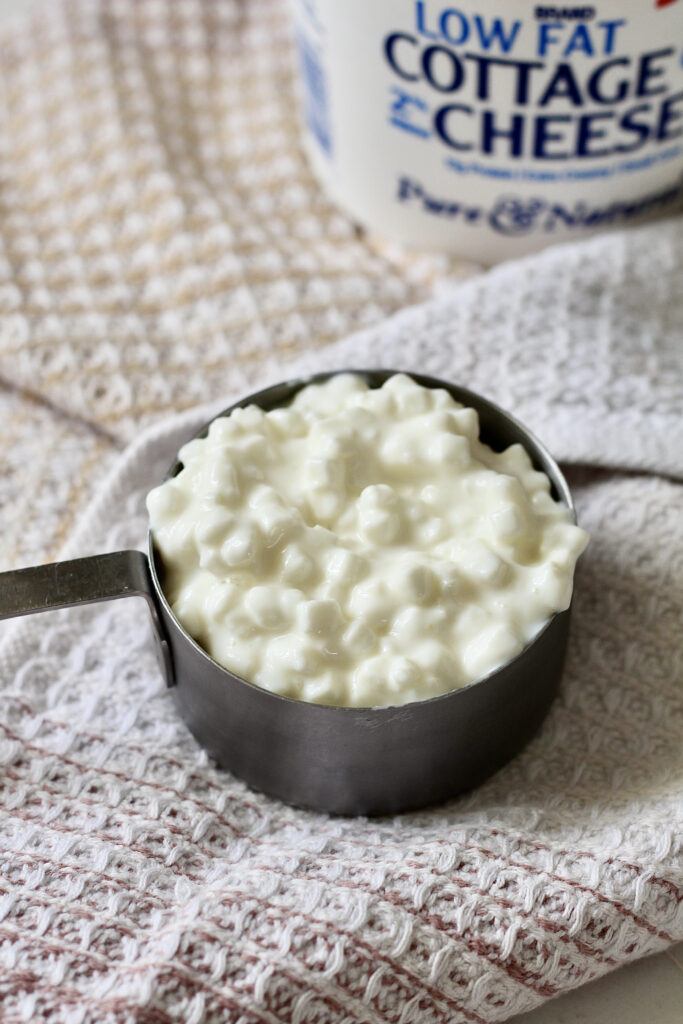Cottage cheese has grown rapidly in popularity over the last year or so thanks to some viral social media moments, but is cottage cheese good for diabetes?
Is cottage cheese good for diabetes? There are many questions people have when it comes to cottage cheese and diabetes, including whether or not to eat it, what kind is best, and how much to eat. So let’s take a closer look at these and I’ll provide my insights as a diabetes dietitian and an individual with type 1 diabetes.

Can people with diabetes eat cottage cheese?
Perhaps one of the most important questions to answer first is if you should include cottage cheese as part of your food choices. The simple answer is yes, people with diabetes can absolutely enjoy cottage cheese! Cottage cheese has long been a staple in many diets, valued for its high protein content and versatility in recipes.
Is cottage cheese bad for people with diabetes?
No, cottage cheese is not bad for people with diabetes. In fact, it’s the exact opposite! Cottage cheese makes a great protein source for people with diabetes or anyone who has to pay attention to their blood sugars.
Nutrition info and carbohydrates in cottage cheese
A half-cup serving of cottage cheese contains approximately:
- Protein: 14g
- Carbohydrates: 3-6g (depending on the variety)
- Fat: 4-5g
- Calories: 90-120
Cottage cheese is also a good source of several essential nutrients:
- Calcium
- Phosphorus
- Selenium
- Vitamin B12
These nutrients are important for overall health and can contribute to better diabetes management.
The exact nutritional composition of cottage cheese can vary depending on the brand and type of cottage cheese, such as full-fat, low-fat, or fat-free varieties.

Cottage cheese benefits
Cottage cheese is known for its high protein and low carbohydrate content. Compared to other dairy products, cottage cheese is relatively low in carbohydrates. This can be beneficial for individuals paying attention to their carb intake to manage diabetes.
Cottage cheese glycemic index
The glycemic index tells us how quickly a food can raise blood glucose levels. (It does not take into account how much carbohydrate is in a food.) The glycemic index of cottage cheese is 30. This means that cottage cheese is a low glycemic index food.
- Low glycemic: 0-55
- Medium glycemic: 56-70
- High glycemic: >70
Cottage cheese glycemic load
The glycemic load, however, is a more accurate picture of how much and how quickly a food may raise blood sugar levels. The glycemic load considers both how quickly a food can raise blood sugar levels and how much carbohydrate is in the food.
This tells us how much of an impact a food can potentially have on blood sugar levels. The glycemic load of cottage cheese is 0.3-0.6, making it a low glycemic load food.
- Low GL: 0 – 10
- Moderate GL: 11-19
- High GL: 20+
Low glycemic load foods are considered more beneficial for people looking to maintain stable blood sugar levels. So, is cottage cheese good for diabetes? I would say yes.
Sugar in cottage cheese
Most cottage cheese varieties contain very little sugar. A half-cup serving will typically have less than 1-2g of sugar.

What kind of cottage cheese is good for people with diabetes?
People with diabetes should look for cottage cheese varieties with little to no added sugar. And, consider the fat content. Depending on other health needs, a low-fat or reduced-fat cottage cheese may be best.
How to enjoy cottage cheese for people with diabetes
Cottage cheese can be enjoyed in several different ways. One of the best things about it is its versatility. It can be enjoyed savory or sweet. Some great flavor parings include cottage cheese and:
- Fresh fruit
- Roasted nuts
- Granola
- Low-sugar chocolate chips
- Salsa
- Cucumbers and tomatoes
For more ways to enjoy cottage cheese check out my 9 high protein cottage cheese snack ideas:

Want to try cottage cheese in a recipe? Check out my Copycat Baked Starbucks Bacon Egg Bites!

How much cottage cheese should you eat a day?
A typical serving of cottage cheese is about a half cup in volume. How much to enjoy specifically for you will depend on many factors. Speak to your doctor or dietitian for individual recommendations.
Bottom line: Is cottage cheese good for diabetes?
Cottage cheese can be a great option for people with diabetes. Thanks to its high protein and low carbohydrate content, and low glycemic index value, it fits well into a blood sugar-friendly eating pattern. Choose plain varieties without added sugars.
As always, it’s essential to consult with a healthcare professional or registered dietitian to personalize dietary recommendations based on your individual needs and preferences.
More resources
Wondering what other foods are good for people with diabetes? Check out these other articles:
- Are Sweet Potatoes Good For Diabetes?
- Are Beets Good for Diabetes?
- Is Oatmeal Good for Diabetes?
- Is Pineapple Good For Diabetes?
- Are Peanuts and Peanut Butter Good For Diabetes?
Sources
- Cabot Creamery: Cottage Cheese Mix-In’s
- Glycemic Index: Cottage Cheese
- Pasin, G., & Comerford, K. B. (2015, May 15). Dairy Foods and dairy proteins in the management of type 2 diabetes: A systematic review of the clinical evidence. Advances in nutrition (Bethesda, Md.). https://www.ncbi.nlm.nih.gov/pmc/articles/PMC4424779/
- USDA: Nutrient database, cottage cheese





